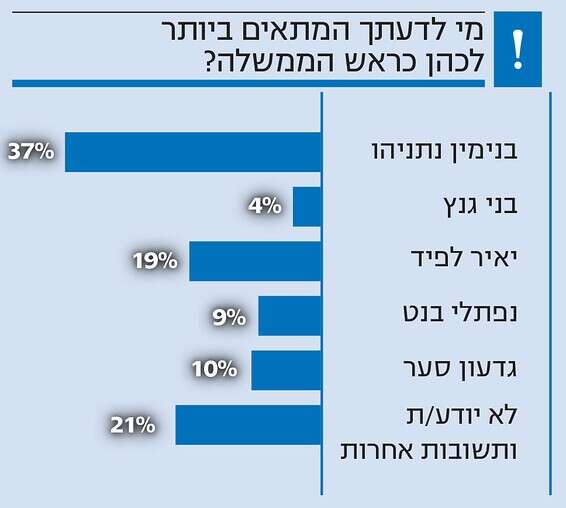
Photo: Benjamin Netanyahu’s Facebook page
A “Israel Today” poll conducted through the “Database of Minds” led by Prof. Yitzhak Katz shows that if the election had taken place today, the Likud would have received 30 seats. Yesh Atid, the second largest party, with 18. 11 seats. Gideon Saar drops to a low of 10 seats and seems to be losing momentum. Shas, according to the poll, receives 8 seats and Torah Judaism 7. Religious Zionism rises to 5 seats.

According to the poll, the swinging parties on the left pass the blocking percentage: Labor with 6, Blue and White gets 5 while Meretz passes with 4 seats. The joint list receives 9 seats, while RAAM does not pass the blocking percentage, as does Yaron Zelicha’s new economic party. Yisrael Beiteinu receives 7 seats.
The economic crisis first
On the question of suitability for prime minister, Benjamin Netanyahu continues to lead safely with 37%. Followed by Yair Lapid with 19% support. 21% do not know or have answered other answers.


The survey examined what is the most important issue that the next government should address. The economic crisis took first place. 53% believe that this is the most important issue. Corona crisis in second place with 18%. The rifts in society are then marked as the most important issue among 15% of respondents, while the Iranian nuclear and political issue are pushed to the bottom of the list of priorities with 4% each.

The legal issue is also firmly on the table, though no party has actually made it its flagship issue in this election. When asked who should decide on the enactment of laws, the Knesset or the High Court, 52% answered that the Knesset is the one that decides. 38% said that it is the High Court that decides, and 10% do not know. In analyzing the results, and not surprisingly, the right-leaning parties are more in favor of the Knesset’s authority. The left-wing parties prefer the High Court. Among New Hope voters, 46% prefer the sovereignty of the Knesset over the High Court.

Towards a term of office?
And what about the restriction of tenure? Prime Minister Netanyahu has been in office continuously since 2009, in addition to three more years in the 1990s. It turns out that 62% believe that such a precedent must not happen again and that the term of office of the Prime Minister of Israel should be limited. 27% believe that the term of office of the Prime Minister should not be restricted. 11% do not know. Among Likud voters, 55% believe that the term of office of the prime minister should not be restricted. 32% think there should be a limit.
In the run-up to the polls that are about to open, and against the background of the multiplicity of parties, it seems that the boundaries between right, left and center have completely blurred. The survey examined how the Israeli public defines itself, without partisan division. The survey shows that the majority of the public defines itself as right-wing, or center-right. 37% said they were right. 21% defined themselves as center-right. 20% placed themselves in the center. 8% center-left, while 11% defined themselves as leftists. Even among those who define themselves as “secular” there is a right-wing majority. 28% of them on the right. 23% center-right. 27% defined themselves as a center. 13% center-left, and only 7% defined themselves as leftists.